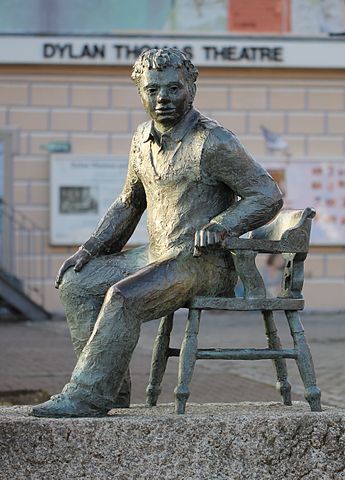Today a poem that people like myself can’t hear anymore, so often has it been repeated and analysed. Dylan Thomas (1914-1953) wrote this for his ailing father. I found a formal analysis online, that is devoid of passion and reminded me why I am doing this. Poetry gets so boring if you must interfere with academic and formal babble at every corner. Cut it off, we know this is a vilanelle in iambic pentameter. Ok, if you get off on that kind of stuff, here you go. There is some teary background information about Dylan’s dad as well. But don’t say I didn’t warn you against the vomitive conclusion of mr. Spacey’s analysis.
Do Not Go Gentle Into That Good Night
Do not go gentle into that good night,
Old age should burn and rave at close of day;
Rage, rage against the dying of the light.Though wise men at their end know dark is right,
Because their words had forked no lightning they
Do not go gentle into that good night.Good men, the last wave by, crying how bright
Their frail deeds might have danced in a green bay,
Rage, rage against the dying of the light.Wild men who caught and sang the sun in flight,
And learn, too late, they grieve it on its way,
Do not go gentle into that good night.Grave men, near death, who see with blinding sight
Blind eyes could blaze like meteors and be gay,
Rage, rage against the dying of the light.And you, my father, there on the sad height,
Curse, bless, me now with your fierce tears, I pray.
Do not go gentle into that good night.
Rage, rage against the dying of the light.
What can we say? Everything about this poem has already been sad, by wiser and more imperious men than we aspire to be. The rhythm rocks, consonants, assonants, repetitions, enjambments are strewn in a brilliant way and … bla bla blah
How is dark “right”? This is not a translated poem (or is it, and from which language, mr. Thomas?) How can darkness be right? Natural tendency, thermodynamics: increasing entropy? Or is it the impossibility that gives meaning to the rage? Or is it more mundane. Their “words had forked no lightning” (Dylan père never published his own poetry, I read). It seems a bit cynical to me, and not very nice to his dad (this is the weak joint of this poem.
Okay, frail deeds dancing in a green bay, f*ck yeah. Love it. The words just fit that metre tight like a condom, and the wave associates with the bay and even in their crying they rage (or does it become obvious, half way the poem, that it’s the author’s wish and desire that the good old man rage?)
Next up are the wild men. They were succesful because they sang the sun in flight, but realized too late that also they cannot escape death. And the grave men near death (ambiguity put to good use), so we’re talking death bed now. And their the rage intensifies once more. Today I read how dr. Freud fought his fucked up illness at 83 and refused painkillers to keep his mind bright until the end. Death had, according to Stefan Zweig’s description, distorted his cheeks, front, lips – but failed to penetrate his eyes as long as his will was alive. Dylan talks about blind eyes (they have blinded themselves I guess) that blaze like meteors and be gay. Here it becomes obvious that Dylan’s wish is not realistic. Blind eyes are dull and don’t blaze, except in our, and who knows, the blind man’s, imagination.
Only in his conclusion he mentions the father: powerful. Why the height and the pedestal? Does Dylan need de Voice of a Father and paints him as a creature who is high? An angel, who can curse and bless his son with the fierce tears in his blinded eyes? Yes, curse: Despite this powerful hymn the tears confirm that dark is right, that the light is dying. And bless: We share this rage among generations, it is the source of understanding and peace.
p.s. I like the bronze
p.p.s. What do you think about head on no bullshit poetry babble, as attempted in this series?

One thought on “Reading: Do not go gentle… by Dylan Thomas”
Comments are closed.